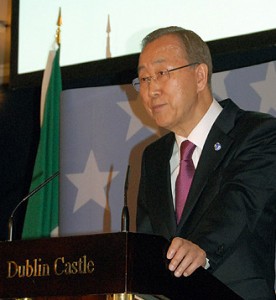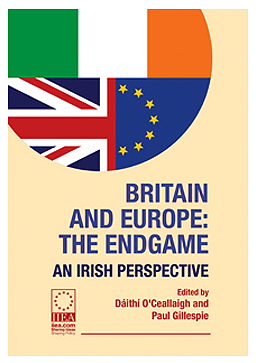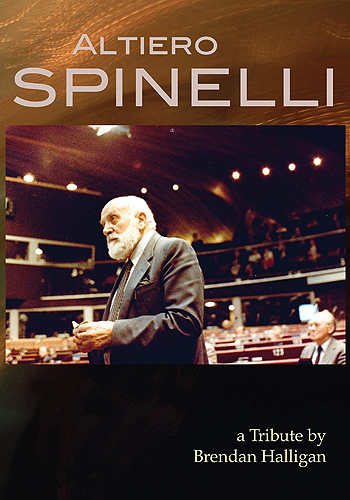 On 25 May, 2015, Ban Ki-moon visited Dublin Castle for the launch of a programme that highlights Ireland’s contribution and commitment to the United Nations over the last 60 years. At the launch, co-hosted by the Institute of International and European Affairs and Ireland’s Department for Foreign Affairs and Trade, UN Secretary-General Ban Ki-moon delivered a lecture in St Patrick’s Hall entitled: The UN at 70: Looking back, Looking Forward.
On 25 May, 2015, Ban Ki-moon visited Dublin Castle for the launch of a programme that highlights Ireland’s contribution and commitment to the United Nations over the last 60 years. At the launch, co-hosted by the Institute of International and European Affairs and Ireland’s Department for Foreign Affairs and Trade, UN Secretary-General Ban Ki-moon delivered a lecture in St Patrick’s Hall entitled: The UN at 70: Looking back, Looking Forward.
At the event, attendees included former Taoiseach, Liam Cosgrave, who was Minister for External Affairs in 1955 when Ireland joined the United Nations; UN Special Envoy for Climate Change and former Irish President Mary Robinson; Minister for Foreign Affairs and Trade, Charlie Flanagan, TD, IIEA Chairman Brendan Halligan, Director General of the IIEA Tom Arnold and Jill Donoghue, Head of Research, IIEA, Peter Sutherland, United Nations Special Representative to the Secretary-General on International Migration and Richard Ryan, former Irish Ambassador to the UN in New York.
For full photographic coverage of this event, click here
At the recent launch for the new book, “Britain and Europe: the Endgame”, Brendan Halligan gave a speech to introduce his contribution at the Institute of International and European Affairs. To view the video, click below.
Britain’s fraught relationship with Europe is analysed in this study prepared by Ireland’s leading think tank, the Institute of International and European Affairs (IIEA).
The third in a series that stretches back over 20 years, the authors argue that the relationship has entered the endgame. If not managed with daring and imagination, it could result in Britain exiting from the European Union, perhaps unwittingly.
The consequences are examined under a number of headings, including: the political and economic future of the United Kingdom; its options for a new external relationship with Europe; the political impact on the European Union; the implications for Ireland, with particular reference to the economy; and on the totality of Irish-British relations, with special attention to the effect on Northern Ireland.
The threat of UK withdrawal requires a unique response. This study proposes a bespoke solution by creating a Union with four cores which would enable Britain to be simultaneously both inside and outside the Union. The proposal has the great merit of dealing with political realities and of preventing a potential disaster for all concerned.
The study closes with a series of recommendations for pre-emptive action by the EU as whole and by Ireland in particular.
The book is edited by Dáithí O’Ceallaigh and Paul Gillespie. It contains chapters by ten contributing authors: Tom Arnold, John Bradley, Tony Brown, Paul Gillespie, Brendan Halligan, Blair Horan, James Kilcourse, John McGrane, Edgar Morgenroth and Dáithí O’Ceallaigh.
It follows two previous books on this theme from the IIEA: ‘Blair’s Britain, England’s Europe – A View from Ireland’ (ed. Paul Gillespie, 2000) and ‘Britain’s European Question: The Issues for Ireland’ (ed. Paul Gillespie, 1996).
The book can be downloaded here.
In an Op Ed piece in the Irish Independent today, Brendan Halligan comments on how Ireland “must fight to keep Britain in the EU” in the country’s Interest.
The article co-incides with the launch today of a new book by the IIEA, Britain and Europe: The Endgame – An Irish Perspective.
“It was David Cameron himself who described what is happening to Britain’s relationship with Europe as “sleepwalking towards the exit”. That’s a pretty accurate description of developments since he became prime minister. Having started out as someone who was fed up with his party banging on about Europe, as he called it, he has finished up as the man who intends to put Britain’s EU membership on the line.
He recently explained why he took the decision to hold a referendum: it was untenable to keep dodging the question he said. The reason for that, as we know, is the rise of Ukip, which wants Britain out of the EU and which is eating into the Conservative Party’s support. Some two-thirds of the Conservative membership also want Britain to leave and it is this combination of forces which is pushing Britain towards the exit, with its eyes shut” … (more…)
 Tomorrow, just six weeks ahead of the UK general election, the IIEA will be launching a major new book entitled Britain and Europe: The Endgame – An Irish Perspective.
Tomorrow, just six weeks ahead of the UK general election, the IIEA will be launching a major new book entitled Britain and Europe: The Endgame – An Irish Perspective.
The study examines the future of Britain’s role in the EU, focusing on the potential dangers of a UK exit from the union. Its contributors include Tom Arnold, John Bradley, Tony Brown, Brendan Halligan, Blair Horan, James Kilcourse, John McGrane and Edgar Morgenroth.
Four possible scenarios are explored, particularly within political and economic contexts and considering the implications for Ireland and the effects such a strategy might have on Northern Ireland and Irish-British relations. The book is edited by Daithí O’Ceallaigh, former Irish Ambassador to Britain, and Paul Gillespie, Irish Times columnist and former Foreign Editor.
At a launch event scheduled for Thursday 26 March, speakers will include IIEA Chairman Brendan Halligan, Paul Gillespie of the Irish Times and John McGrane, co-founder of the British Irish Chamber of Commerce. The evening will be moderated by Daithí O’Ceallaigh. Books will be available for purchase at the event.
 One of the founding fathers of the European Union, Altiero Spinelli was a co-author of the historic Ventotene Manifesto, an influential figure in the European federalist movement and later a member of the European Commission, and MEP.
One of the founding fathers of the European Union, Altiero Spinelli was a co-author of the historic Ventotene Manifesto, an influential figure in the European federalist movement and later a member of the European Commission, and MEP.
This paper explores the man, his personal story and his success as a European innovator and facilitator.
“It is proper to commemorate Altiero Spinelli when marking the sixtieth anniversary of the Schumann Declaration. Along with Monnet and Delors, he belongs in the European Pantheon dedicated to those who created and built the European Union of today.
He stands in the middle between these two great Frenchmen, for if Monnet gave life to the ideal of integration and nurtured it through its infancy, and if Delors was to steer it from adolescence to early adulthood, it was this great Italian who inspired the first and guided the second, and who led Europe at a moment of crisis on the passage from childhood to adolescence.
In his memoirs, Monnet reminds us that while institutions endure, nothing can be achieved without the individual, that special type of individual who puts their stamp on history and leaves the world a different place; in Spinelli’s case, a better world. Each of these three men, whose lives overlapped and intertwined, not only understood how the world of politics works, but more importantly, knew how to make it for the purpose of change, transformational change.
Interesting too, that while each was the product of his own intensely local culture, all three focused their intellects and energies on promoting the European ideal; none ever held the highest office in their country; and all three spent the latter part of their career exclusively devoted to European affairs.” … (more…)